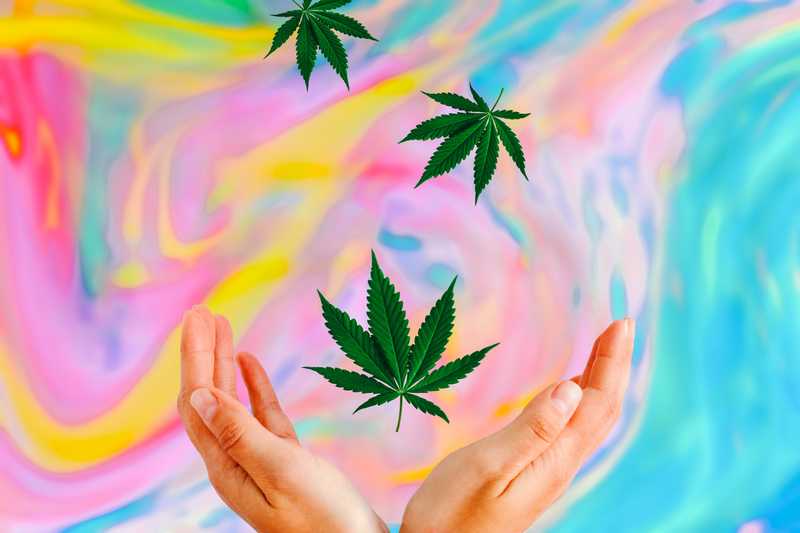While cannabis and psychedelics were long associated with counterculture and mind-bending trips, both are increasingly being looked at for their therapeutic uses.
The legalization of cannabis in Canada and the growing push to legalize it in the United States, is making many look at the potential of them working individually or together to supply a range of health benefits.
In 2017, the American Journal of Managed Care ran an article, “The Therapeutic Potential of Marijuana and Psychedelics. “Marijuana, classic hallucinogens, MDMA, and ketamine have all shown some evidence for therapeutic applications in a wide variety of psychiatric and neurological conditions. However, Schedule I status [in the United States] severely limits ability to research.” said William M. Suavé, MD, medical director, Greenbrook TMS NeuroHealth Centers, in the article.
“Most studies to date are small, underpowered, and have other methodological flaws; however, promising results from existing studies suggest that larger studies are warranted.”
The Push to Legalize Psychedelics
The last few years have seen explosive growth in the legal cannabis industry, with the legalization in Canada and the continued legal growth in the U.S. at the state level and with a major push to decriminalize federally.
Recently there’s also been a movement to make psychedelics available for therapeutic use in the two countries. As part of a “psychedelic renaissance,” a number of U.S. cities and districts have sought to decriminalize “magic mushrooms” (psilocybin), to make it available for research and treatment of conditions such as depression, anxiety, PTSD, suicidal thoughts and more.
Oregon, for example, entered the history books by voting for Measure 109, which approves the use of psilocybin-producing mushrooms in therapeutic settings. The Food and Drug Administration (FDA) has approved and fast-tracked several clinical research trials involving psychedelics and hallucinogens' therapeutic uses.
Canada also put the gears in motion, last year, to start legalizing these drugs when the federal health ministry allowed four cancer patients to use psychedelic mushrooms as part of their end-of-life psychotherapy treatment.
Canadian-based companies are also doing major work in studying psychedelics for health and offering groundbreaking therapies. For example, MindMed in Toronto is doing trials to see if LSD can be used to treat cluster headaches and adult ADHD. And it is researching 18-MC, a proprietary, non-hallucinogenic molecule based on the psychedelic ibogaine, which can be taken to treat opioid addiction.
Or Field Trip Health and Numinus Health are each setting up a network of clinics in Canada and the United States to use ketamine to treat depression in psychedelic-enhanced therapy sessions. Plans are to expand to MDMA and psilocybin when and if these drugs are legalized in Canada.
The Effects of Hallucinogens and Cannabis
When talking about these different drugs' therapeutic effects, people often refer to the term “microdosing” — that is, taking small controlled doses to enjoy health benefits without heavy psychoactive effects.
Microdoses of cannabis can help relieve stress and mood disorders by releasing dopamine into the system, which helps you feel good. Cannabis microdoses can also help to relieve pain, improve focus and promote sleep.
While the cannabinoids in marijuana work through the endocannabinoid system, a hallucinogen such as LSD can boost serotonin levels in the brain and a feel-good chemical that can cause hallucinations larger doses.
CAMH, the Canadian mental health and addiction authority, describes the effects of a few of the major hallucinogens (not taken in microdoses):
LSD — a synthetic, it produces a kaleidoscope of visual patterns and changes perception and a reduction in depression. People know that the LSD hallucinations are not real, even though the effects can appear real.
MDMA — an empathogen, which enhances mood and produces feelings of empathy and intimacy and has shown efficacy improving the symptoms of PTSD.
Ketamine — a dissociative which causes out-of-body feelings and may help with depression.
Psilocybin - a hallucinogenic substance people ingest from certain types of mushroom. It works by activating serotonin receptors, most often in the prefrontal cortex. This part of the brain affects mood, cognition, and perception.
As said, the intent of microdosing psychedelics is not to create psychoactive experiences. Doing this has been compared to having an extra cup of coffee or getting a “rosy glow.”
Using Psychedelics and Cannabis Together
Since both cannabis and the harder psychedelics may both deliver health benefits, increasingly people are wondering if they may work together to amplify their effects.
For example, there’s anecdotal evidence to suggest that a CBD-high strain of cannabis can help with the feeling of nausea and anxiety that some people have consuming magic mushrooms. Or THC-high cannabis can serve to amplify its effects, creating more intense sensations and thought patterns, and, in higher doses, hallucinations. Cannabis might also be used to prolong the effects of psilocybin. However, use caution if combining cannabis and psychedelics as both alone are powerful substances - especially cannabis high in THC.
Psychedelics may also cause physiological effects such as increased blood pressure and heart rate, which can trigger anxiety, paranoia, and panic. Cannabis helps to regulate the body’s system of homeostasis through the endocannabinoid system, which may help address some of the effects of the other drug.
But this is unproven scientifically. Other evidence shows that in some cases cannabis can produce side effects that can include panic and anxiety, high blood pressure, low blood pressure, and increased heart rate — which would not make it a good fit for the psychedelic effects.
While these different drugs may have benefits for people’s mental health issues, in some cases they may make symptoms worse, especially when used together.
It's early days as far as research for cannabis and other hallucinogens. So while they show a lot of promise for their therapeutic benefits used individually and together, wise consumers should exercise caution in combining these drugs and when using psychedelics generally, without the guidance of an experienced healthcare specialist.
